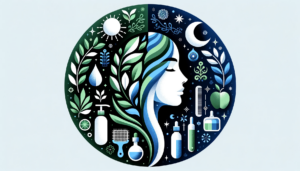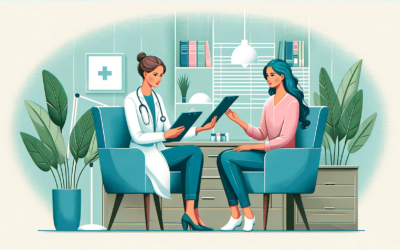Turning the Tide on Thinning: A Guide to Female Hair Loss Treatments
Introduction
 Entering the 40’s brings a wealth of experience and wisdom, but for many women, it also introduces an unwelcome guest: female hair loss.
Entering the 40’s brings a wealth of experience and wisdom, but for many women, it also introduces an unwelcome guest: female hair loss.
From thinning locks to widening partings, the changes in hair can be a source of stress and self-consciousness. However, understanding the roots of hair loss and the range of treatment options available can turn anxiety into action.
In this comprehensive guide, we’ll explore the effective ways to prevent and treat female hair loss, offering hope and solutions for those navigating this common challenge.
Understanding the Causes of Female Hair Loss
Before diving into treatment options, it’s crucial to understand the underlying causes of hair loss in women, especially those over 40. Hair loss at this age can be attributed to a variety of factors:
A thorough examination by a healthcare provider, including blood tests and scalp analysis, can help pinpoint the specific cause, guiding towards the most effective treatment.
Effective Treatments for Female Hair Loss
When it comes to treating hair loss in women over 40, there are several effective options to consider:
Minoxidil (Rogaine):
This over-the-counter medication is applied directly to the scalp and is one of the most common and effective treatments for female pattern hair loss. Regular application is key to its effectiveness.
Lifestyle Changes:
Stress management through practices like yoga or meditation can significantly impact hair health. A balanced diet rich in essential nutrients also plays a critical role in maintaining healthy hair.
Nutritional Supplements:
Supplements like multivitamins and biotin can help, especially if hair loss is related to nutritional deficiencies.
Remember, the effectiveness of these treatments can vary from person to person, and it’s important to be patient and consistent with your chosen method.
Advanced Treatment Options for Female Hair Loss
For those seeking more intensive treatments for hair loss, the following advanced options can be considered:
Laser Therapy:
FDA-approved low-level laser devices, such as laser combs or helmets, have shown promise in improving hair density and health. These devices are designed to stimulate the scalp and encourage hair growth.
Hair Transplant Surgery:
This involves transplanting hair from areas with active growth to the thinning or balding areas. It’s a more invasive option and may require multiple sessions, but it can offer more permanent solutions to hair loss.
Other Medications:
 Research is ongoing for other medications like spironolactone, finasteride, estrogens, and prostaglandin analogs. While not universally approved for female hair loss, they may offer benefits in specific cases under medical supervision.
Research is ongoing for other medications like spironolactone, finasteride, estrogens, and prostaglandin analogs. While not universally approved for female hair loss, they may offer benefits in specific cases under medical supervision.
Consulting Healthcare Professionals for Female Hair Loss Treatment
When it comes to treating hair loss, consulting a dermatologist or a trichologist is a critical step. These specialists can provide:
- Personalized treatment plans, based on your specific hair loss condition, medical history, and lifestyle.
- Professional advice on products and treatments and also provide guidance on what products or medications would be most effective for your type of hair loss.
- Monitoring and adjusting treatments via regular check-ups to assess the effectiveness of the treatment plan and make adjustments as needed.
Hair loss in women, particularly over 40, can be a complex issue with various underlying causes. A professional can help navigate these complexities and offer solutions tailored to your individual needs.
Conclusion:
 Navigating the journey of female hair loss can be challenging, but with the right information and professional guidance, it’s a path filled with hope.
Navigating the journey of female hair loss can be challenging, but with the right information and professional guidance, it’s a path filled with hope.
From simple lifestyle changes and over-the-counter treatments like Minoxidil to advanced options like laser therapy
and hair transplants, there are multiple ways to combat hair loss.
Remember, the key is to start early, stay informed, and choose the path that best suits your individual situation.
Frequently Asked Questions
What are the most effective treatments for female hair loss?
The most effective treatments include Minoxidil (Rogaine), which is applied topically to the scalp, and lifestyle changes such as stress management and improved nutrition. Advanced treatments like laser therapy and hair transplant surgery are also options for more severe cases.
Can lifestyle changes really help with hair loss in women?
Yes, lifestyle changes can significantly impact hair health. Stress reduction techniques like yoga and meditation, along with a diet rich in essential vitamins and minerals, can promote hair growth and reduce hair loss.
Are there specific vitamins or supplements that are beneficial for women experiencing hair loss?
Yes, supplements like multivitamins and biotin can be beneficial, especially if the hair loss is due to nutritional deficiencies. Vitamins B, C, D, E, iron, zinc, and omega-3 fatty acids are particularly important for hair health.
How do hair care practices impact hair loss, and what should be avoided?
Harsh hair care practices can contribute to hair loss. Avoid tight hairstyles, excessive heat styling, and harsh chemical treatments. Gentle hair care practices and using mild, nourishing hair products are recommended.
When should one consider consulting a healthcare professional about hair loss?
It’s advisable to consult a healthcare professional if you experience sudden or significant hair loss, if there’s no identifiable cause for the hair loss, or if it’s accompanied by other symptoms. A dermatologist can provide tailored advice and treatment options based on the individual’s condition.





